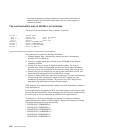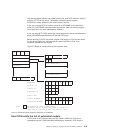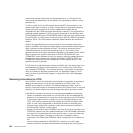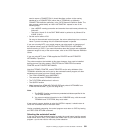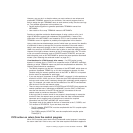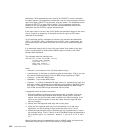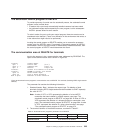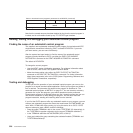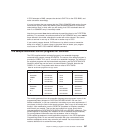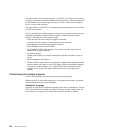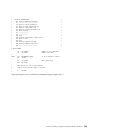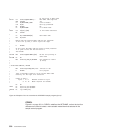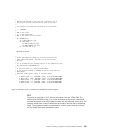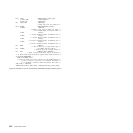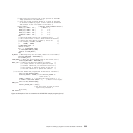
Table 27. Autoinstall control program’s parameter list at DELETE (continued)
1st byte 2nd byte 3rd byte 4th byte
Third fullword Length of netname to be
deleted
First two bytes of netname
Next 15 bytes Remainder of netname
Note that the named resource has been deleted by the time the control program is
invoked, and is not therefore found by any TC LOCATE type functions.
Naming, testing, and debugging your autoinstall control program
Finding the name of an autoinstall control program
The supplied, user-replaceable autoinstall control program for terminals and APPC
single-session connections initiated by CINIT is named DFHZATDX. If you write
your own version, you can name it differently.
After the system has been loaded, to find the name of the autoinstall control
program currently identified to CICS, use either the EXEC CICS INQUIRE
AUTOINSTALL command or the CEMT INQUIRE AUTOINSTALL command.
The default is DFHZATDX.
To change the current program:
v Use the AIEXIT system initialization parameter. For guidance information about
how to do this, refer to the CICS System Definition Guide.
v Make the change online using either the EXEC CICS SET AUTOINSTALL
command or the CEMT SET AUTOINSTALL command. For further information
about these commands, refer to the CICS System Programming Reference and
CICS Supplied Transactions, respectively.
Testing and debugging
To help you test the operation of your autoinstall control program, you can run the
program as a normal terminal-related application. Define your program and initiate it
from a terminal. The parameter list passed to the program is described in “The
autoinstall control program at INSTALL” on page 517. You can construct a dummy
parameter list in your test program, upon which operations can be performed.
Running your program on a terminal before you use it properly means that you can
use the EDF transaction to help debug your program. You can also make the
program interactive, sending and receiving data from the terminal.
If you find that CICS does not offer any autoinstall models to your program, you can
create a test autoinstall program that forces the model name (AUTINSTNAME) you
want. With a VTAM buffer trace running, try to log the device on to CICS. If CICS
does not attempt to send a BIND, check the following:
v Does the model TERMINAL refer to the correct TYPETERM? (Or alternatively, is
the TYPETERM in question referred to by the correct TERMINAL definition?)
v Is the TERMINAL definition AUTINSTMODEL(YES or ONLY)?
v Have you installed the group containing the autoinstall models (TERMINAL and
TYPETERM definitions)?
526 Customization Guide



